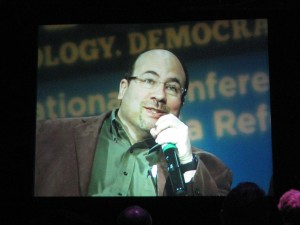About Astroturf
What would you like to know about the Koch Brothers and their "astroturf" campaigns? Yesterday, I had the opportunity to hear from several panelists on the topic at the National Conference for Media Reform. The panelists included Lee Fang, who is almost a legend among progressives for his detailed investigations regarding the Koch Brothers (his blogs can be found on ThinkProgress - here's one of his more recent posts). Why is it important to study these fake social movements? Fang responded that law makers believe "citizens groups" more than the do corporate groups. Thus, groups of citizens get some instant cred that they don't deserve. Further, news reporters love to cover rallies of "citizens." If corporate movements can be disguised as citizen movements, then they obtain an unfair advantage. It's also important to note that there are various types of astroturf groups out there, including liberal-oriented astroturf groups (former Clinton Press Secretary Mike McCurry was pointed out as being a player). It is the conservatives who have made the most extensive use of such citizen-facades, however. The panelists pointed out that the Koch Brothers are uniquely positioned as able to spread their message through these faux-citizen groups based on their corporate connections and great wealth. If you're looking for the "blueprint" of their movement, consider Lewis Powell's memo to the Chamber of Commerce, "which has served as the blueprint for the past 40 years." Also consider the "Rancho Mirage Memo." Doug Clopp of Common Cause also presented as part of the panel, and I videotaped most of his presentation: Footnote: Conservatives have successfully recruited and even featured Supreme Court Justices Scalia and Thomas to their organizational meetings. It was also noted that, amazingly, the U.S. Judicial Code of conduct does not apply to the U.S. Supreme Court. Representative Murphy has recently sponsored a proposed change in the law to address this issue.

